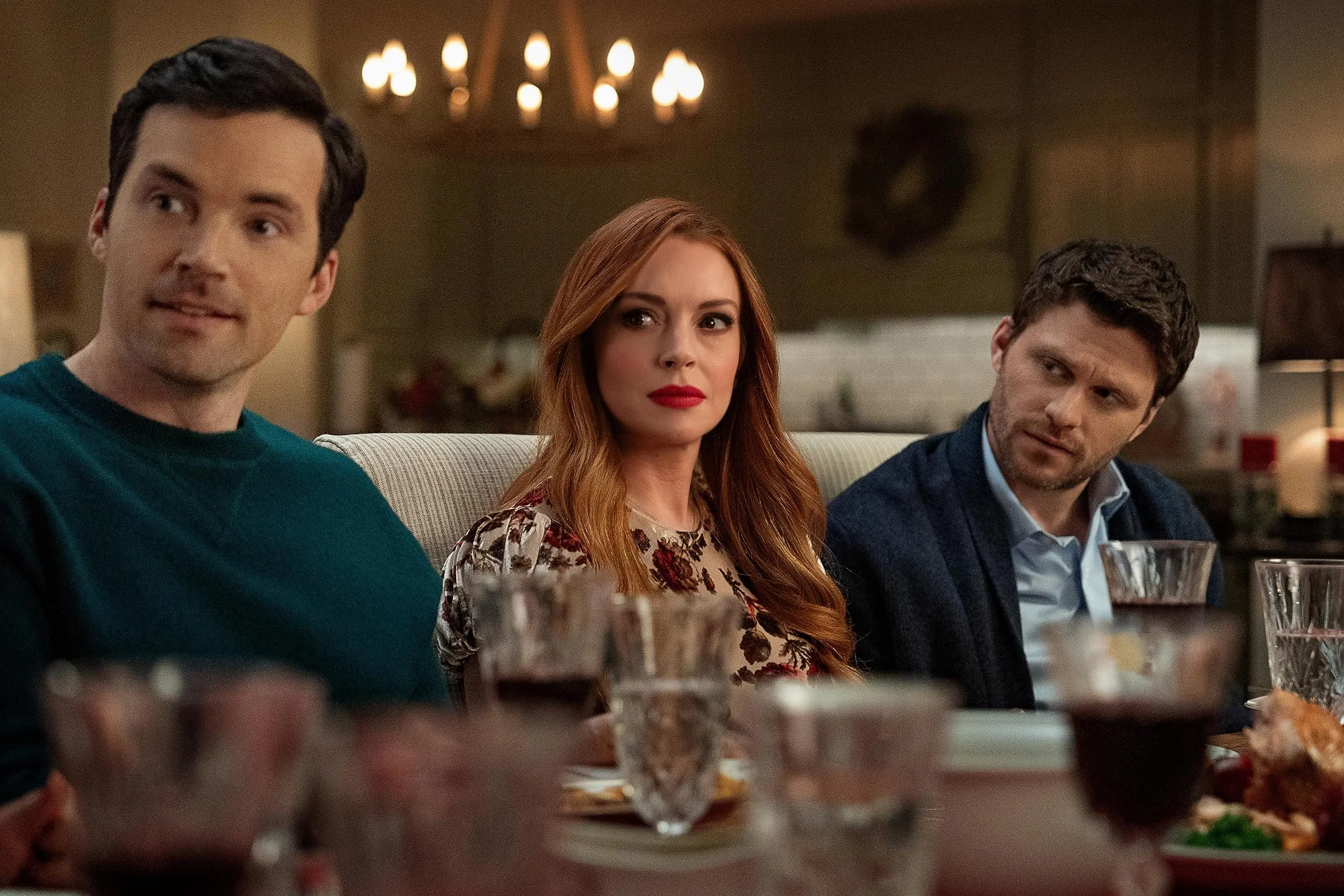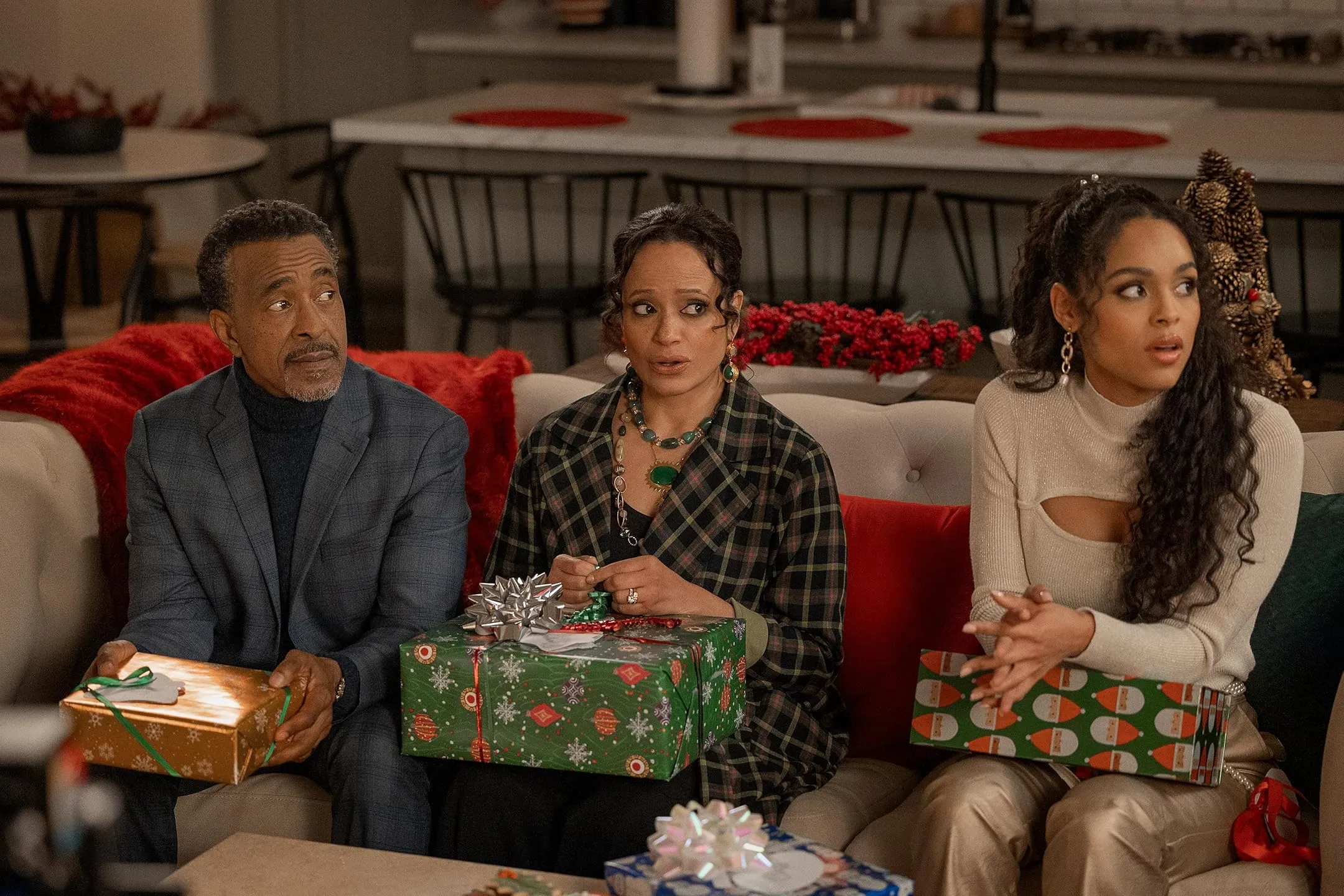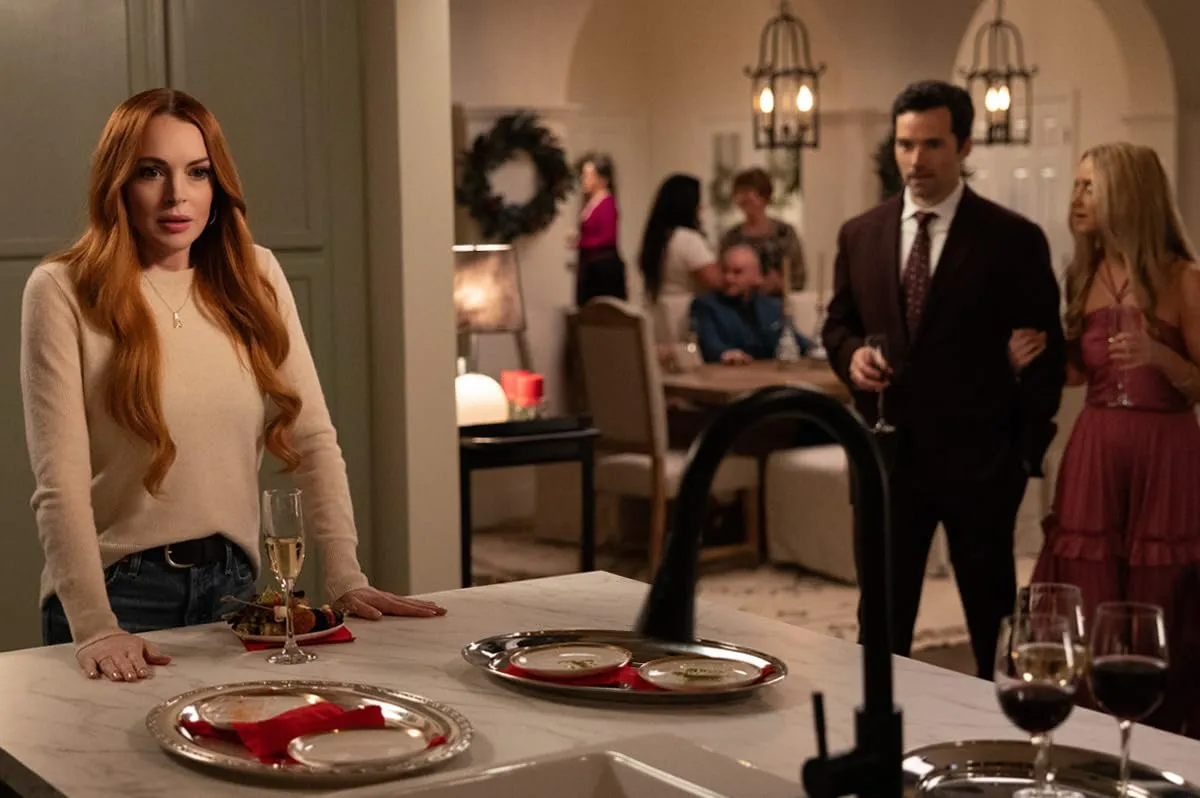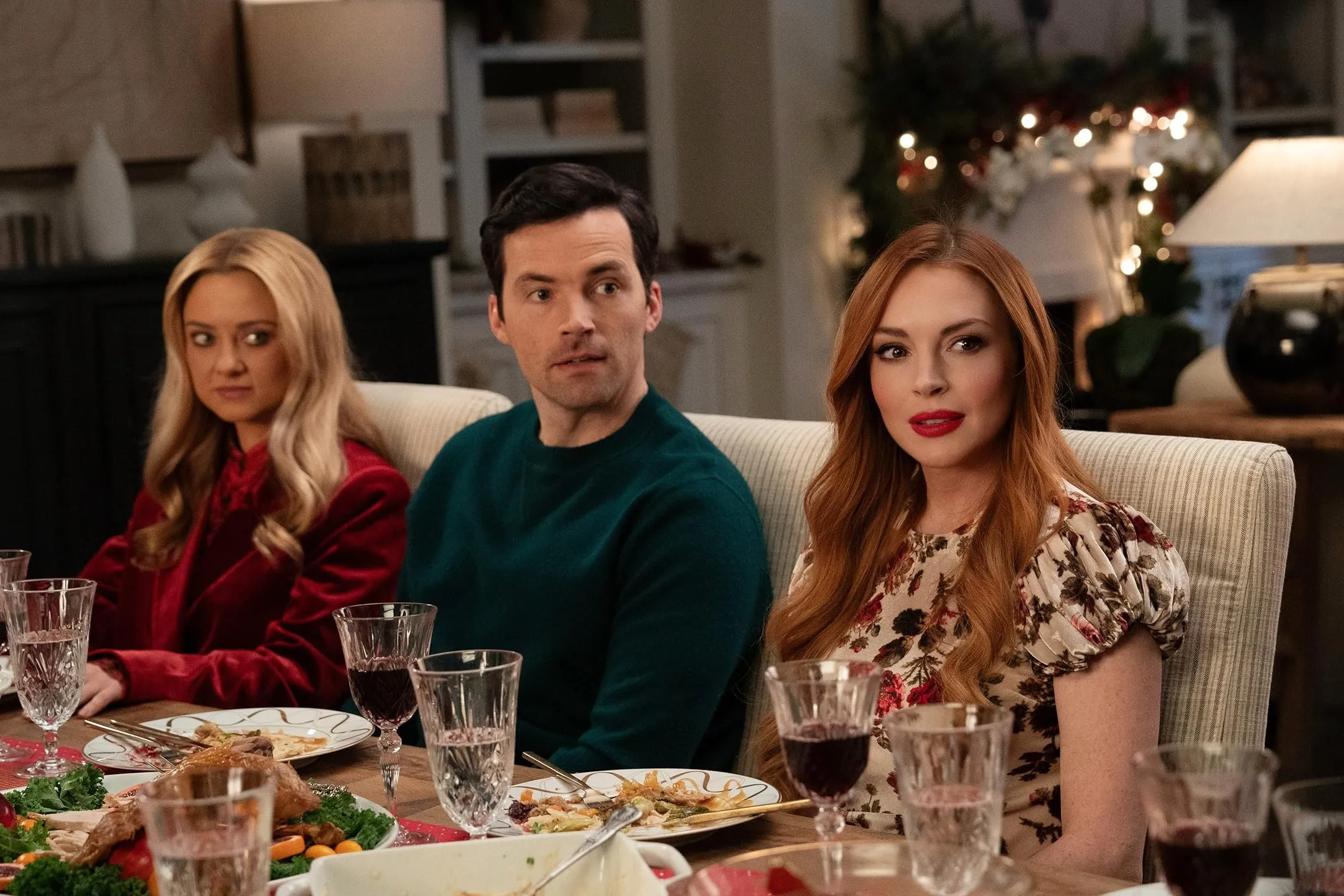Lindsay Lohan continues her Netflix holiday movie comeback with “Our Little Secret,” a fun screwball comedy demonstrating she hasn’t lost her comedic flair. After nearly a decade away from the big screen, Lohan has found her right fit in the world of seasonal romantic comedies, delivering performances that combine her typical relatability with true comedic aptitude.
The film follows Avery, a wealthy business consultant, as she finds herself in a comically complex predicament at a Christmas family reunion. When she arrives with her boyfriend Cam to meet his family, she realizes that Cam’s sister’s new boyfriend is Logan, her ex-lover from ten years ago. A lovely ballet of secrets, awkward interactions, and surprise reunions follow.
The movie throws Avery and Logan together in a situation where they must pretend not to know each other well. It is set against the backdrop of an ultra-rich family’s holiday feast. Their shared history, a friendship became romance that ended abruptly when Avery departed for a job in London, fuels a rich undercurrent of tension and unresolved emotions.
The idea sets up a typical screwball comedy scenario: two people with difficult pasts forced to live close together, attempting to maintain a veneer while dealing with family relationships, personal history, and unexpected emotions. It’s a setting suitable for comedy and genuine emotional moments, giving viewers a more complex holiday film than the usual seasonal fodder.
Crafting Christmas Comedy: Behind the Scenes of “Our Little Secret”
Little Secret” from a forgettable holiday movie to a surprisingly intriguing comedy. Herek, known for his diverse directing portfolio that includes cult favorites such as “Critters” and “Bill & Ted’s Excellent Adventure,” brings a traditional Hollywood perspective to this Netflix film.
His directing technique takes the film above usual streaming entertainment. Herek produces moments of actual visual brilliance, while many holiday movies feel predictable. He experiments with perspective, occasionally putting viewers in Avery’s shoes as she navigates the pristine, slightly terrifying McMansion of her boyfriend’s family. One memorable scene wonderfully reflects his comedic instincts: a church scenario in which Avery, mistakenly stoned on THC gummies, gives an outrageously inappropriate reading that turns into a surreal comic set piece.
The production design demonstrates Herek’s expertise in creating a world that is both aspirational and a bit ludicrous. The ultra-wealthy family home takes on its character, providing a carefully designed backdrop heightening the comedic tension. The film’s cinematography retains a warm, golden tone, softening the comedy’s otherwise harsh edges.
This production is devotion to feeling like a “real” movie distinguishes it. Unlike many streaming holiday offerings that appear quickly put together, “Our Little Secret” has the polish of a mid-budget studio comedy. The attention to visual details, meticulously crafted comedy moments, and performances all point to a more considered approach to the genre.
Herek understands the delicate balance of a good screwball comedy: generating scenarios that are ludicrous but somehow believable. His directing helps Lindsay Lohan to demonstrate her comedic abilities, allowing her to produce sophisticated physical comedy and smart reactions that improve the content.
The end product is a holiday comedy that feels both nostalgic and current. This tough mix reflects Herek’s extensive filmmaking expertise.
Comedic Connections: Performances that Power the Narrative
Lindsay Lohan reclaims her comedic crown in “Our Little Secret” with a performance that is both familiar and shockingly adult. As Avery, she exemplifies the archetypal rom-com heroine: successful, a little fragile, and completely magnetic. Her character navigates family dynamics with a great balance of polish and terror while retaining the trademark Lohan charm that made her a teen movie icon.
Lohan’s comedic timing shines finest in the film’s most daring moments. The church sequence, in which she mistakenly gets stoned during a children’s service, is a masterclass in physical comedy. She lends Avery a subtle sensitivity, especially in moments where she explores her grief over her mother’s death. Lohan’s performance reveals that she hasn’t merely returned to acting; she has evolved.
Logan, played by Ian Harding, is a subtle counterbalance to Lohan’s intensity. He’s not your usual rom-com leading man but rather a more grounded, genuine, kind guy attempting to navigate complex relationships. Harding approaches the role with a refreshing restraint, producing a character that feels more like a real person than a love movie archetype. His chemistry with Lohan stems not from emotional declarations but from a profound comprehension of their shared history.
Kristin Chenoweth’s portrayal of Erica, the razor-sharp mother of Avery’s lover, dominates practically every scene. She’s a Southern belle with the accuracy of a military strategist, dishing out backhanded compliments that cut glass. Chenoweth elevates what could have been a one-dimensional character into a wickedly engaging presence, adding layers of humor and subtle subtlety.
The supporting cast fights to overcome their typical character constraints. Tim Meadows and Judy Reyes are terrific comedic talents who feel unappreciated. Katie Baker’s Cassie has some funny moments but lacks the substance to be genuinely memorable. Cameron, played by Jon Rudnitsky, is fairly one-dimensional, functioning as more of a plot device than a fully developed character.
What elevates the performances is their shared dedication to discovering genuine humanity within the comedy. Even when the events are absurd, the actors keep the film grounded with genuine emotional connections. Lohan, in particular, proves why she was once Hollywood’s most promising young talent and why she may be again.
The performances elevate “Our Little Secret” from a traditional holiday rom-com to a more sophisticated one. They remind us that great comedy is more than just telling jokes; it is also about finding truth in human interactions.
Plotting Festive Chaos: The Screenplay’s Delicate Dance
The writing for “Our Little Secret” reads like a meticulously planned comedic dance, negotiating the difficult terrain of family dynamics and concealed history. At its foundation, the story is based on a beautifully simple yet potentially explosive premise: two ex-lovers are forced to pretend they’re strangers while spending a four-day holiday weekend with their new partners, who are brothers.
Hailey DeDominicis, the screenwriter, creates a planned and deliciously anarchic narrative. The plot’s skeleton – Avery and Logan’s decade-long divorce, exacerbated by a rejected marriage proposal and subsequent career changes – provides a rich emotional backdrop for the comedic antics. Each plot point feels like a possible trap about to spring, creating continual suspense.
Comedic setpieces emerge naturally, avoiding the forced tone that characterizes many holiday rom-coms. The church sequence, in which Avery reads while accidentally stoned, is a masterclass in escalating comedy. It’s a scenario that strikes the perfect balance between physical fun and genuine character sensitivity, with a strange CGI animated Mother Mary statue providing an unexpected comedic punch.
However, the screenplay is not without structural issues. The concept of grief, which revolves around Avery’s mother’s death, feels underdeveloped. Some narrative threads appear to dangle perilously, dropping and retrieving with an uneven touch. The third act, in particular, struggles to keep up the tight comedic flow established earlier.
Despite these minor flaws, the script’s strength is its character interaction. The dialogue exudes a screwball comedy spirit that is both modern and nostalgic. Conversations between Avery and Logan reveal a profound bond that extends beyond their love history, giving the comedy great emotional depth.
The screenplay eventually succeeds because it recognizes a fundamental reality about great comedy: the most amusing moments result from genuine human connections. It elevates what could have been a predictable holiday rom-com into something more nuanced: a story about reconciliation, family, and the complex ways individuals navigate their common past.
Framing Holiday Magic: Visual Storytelling in “Our Little Secret”
Netflix’s unique visual language meets nostalgic charm in “Our Little Secret,” resulting in a cinematic experience that is both shiny and warmly intimate. The film bathes everything in an almost mystical amber glow, turning each scene like a golden-hour postcard of holiday bliss. Lindsay Lohan, in particular, benefits from this brilliant treatment, with her face constantly lighted as if she were carrying her own personal lighting team.
The cinematography strikes a precise balance between stylish and naturalistic. While the digital shine may appear fake, it adds to the movie’s fairy-tale atmosphere. Director Stephen Herek employs visual approaches to boost the tale, especially during moments of pure comedic brilliance. The animated opening sequence stands out, with a watercolor-inspired montage that feels like a nostalgic children’s book brought to life, effectively portraying Avery and Logan’s past.
Perhaps the most creative visual moment occurs during the church scene when a CGI-animated Mother Mary statue adds a surreal comedic touch. It’s an excellent illustration of how the film’s visual approach complements its narrative: surprising, a little silly, and ultimately charming.
The cinematography does more than merely chronicle the story; it actively participates, employing warm tones and beautifully framed frames to emphasize the emotional and comedic points. It elevates what could be a typical holiday rom-com into something both familiar and slightly magical.
Healing Laughter: Navigating Grief and Connection
Under its glittering holiday comedy façade, “Our Little Secret” contains a surprisingly serious meditation on grief and emotional recovery. Avery’s journey is discreetly grounded by her mother’s death, a history that gives surprising depth to what could have been a light romantic comedy.
The film views grief as a nuanced emotional landscape that shapes Avery’s relationships and decision-making rather than as a heavy dramatic burden to bear. Her unwillingness to confront memories, as well as her defense mechanisms, suggest a character still dealing with major personal loss. The screenplay incorporates grief as a central component of Avery’s emotional architecture rather than simply using it as a plot device.
Family dynamics serve as the furnace in which these complex emotions are tested. Erica, played by Kristin Chenoweth, symbolizes a particularly unique maternal archetype: she is both judgmental and loving, creating an environment in which emotional weaknesses are confronted and potentially healed. The interactions between Avery, Logan, and the rest of the family are a microcosm of reconciliation, demonstrating how troubled relationships may be restored through mutual understanding and history.
The holiday setting is ideal for this narrative, as it is historically connected with family, introspection, and potential transformation. Rather than offering a simple solution, the film implies that healing is messy and difficult and frequently occurs at unexpected moments of connection.
Ultimately, “Our Little Secret” contends that comedy and emotional depth are not mutually exclusive. Laughter becomes a means of emotional processing, helping characters face tough emotions with humanity and grace.
Holiday Hijinks: Rediscovering Romantic Comedy Magic
Lindsay Lohan’s successful comeback to romantic comedies culminates with “Our Little Secret,” a film that recognizes and reinvents the genre’s basic structure. While it is not perfect, the movie is a charming revival of screwball comedy sensibilities for the streaming era.
The film’s main merits are its primary performances. Lohan demonstrates that she hasn’t lost her comedic touch, offering a nuanced performance that combines tenderness and wit. Kristin Chenoweth’s scene-stealing supporting performance transforms what could have been a straightforward holiday narrative into something more complex and engaging.
Admittedly, the movie suffers from underdeveloped supporting characters and sporadic plot complications. Some narrative lines feel undercooked, and not every comedic setup works well.
However, these little imperfections do little to detract from the overall attractiveness. “Our Little Secret” delivers exactly what moviegoers want from a holiday romantic comedy: warmth, genuine chuckles, and emotional sincerity. It’s the kind of movie that works well for a family, offering enjoyment that transcends generational divides.
For fans of nostalgic rom-coms and those looking for a joyful holiday experience, this Netflix offering strikes the perfect balance of comedy and connection. It reminds us that the most unexpected stories can often include the most joyful surprises.
The Review
Our Little Secret
"Our Little Secret" is a surprisingly smart holiday romantic comedy that marks Lindsay Lohan's triumphant comeback to the genre. The film goes beyond conventional streaming fodder, including sharp comedic moments with great emotional depth. Stephen Herek's skillful direction, combined with Lohan's nuanced performance and Kristin Chenoweth's scene-stealing supporting part, transforms what could have been a conventional holiday rom-com into a more memorable viewing experience. The movie captures the essence of classic screwball comedies with a contemporary twist despite some underdeveloped supporting characters and occasional plot conveniences. The film expertly navigates issues of grief, reconciliation, and family dynamics, all wrapped up in a pleasant, humorous package.
PROS
- Lindsay Lohan's comeback performance
- Strong comedic chemistry between lead actors
- Nuanced handling of grief within a comedy framework
- Kristin Chenoweth's scene-stealing supporting role
- Clever script with unexpected comedic moments
CONS
- Underdeveloped supporting characters
- Occasional plot inconsistencies
- Some comedic setpieces feel slightly forced
- Unresolved narrative threads
- Predictable rom-com plot structure





















































